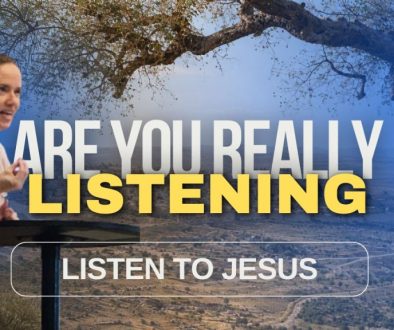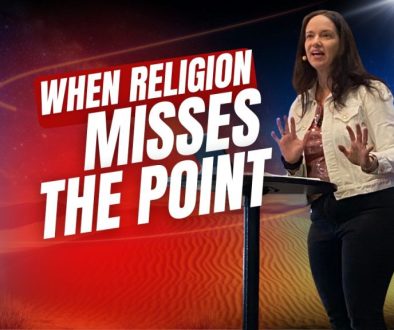Kingdom Encounter Part 3: Good News
The Kingdom Encounter Series has been an opportunity to explore what it means to be a missional church, and to be missionally minded as we follow Christ. In this installment, Josh Hatcher examines the good news.
The main focus of Josh’s message is on the good news, or the gospel, beginning with the prophecy from Isaiah 61, which he reads:
Isaiah 61:1-3 (NIV): “The Spirit of the Sovereign Lord is on me, because the Lord has anointed me to proclaim good news to the poor. He has sent me to bind up the brokenhearted, to proclaim freedom for the captives and release from darkness for the prisoners, to proclaim the year of the Lord’s favor and the day of vengeance of our God, to comfort all who mourn, and provide for those who grieve in Zion— to bestow on them a crown of beauty instead of ashes, the oil of joy instead of mourning, and a garment of praise instead of a spirit of despair. They will be called oaks of righteousness, a planting of the Lord for the display of his splendor.”
Josh explains that this prophecy, written 700 years before Jesus, foretells the coming Messiah, and Jesus himself later reads this passage in the synagogue, as recorded in the book of Luke:
Luke 4:18-21 (NIV): “The Spirit of the Lord is on me, because he has anointed me to proclaim good news to the poor. He has sent me to proclaim freedom for the prisoners and recovery of sight for the blind, to set the oppressed free, to proclaim the year of the Lord’s favor.” Then he rolled up the scroll, gave it back to the attendant and sat down. The eyes of everyone in the synagogue were fastened on him. He began by saying to them, ‘Today this scripture is fulfilled in your hearing.’”
Josh points out that Jesus boldly claims that the prophecy is about him, and he went on to fulfill it by preaching good news and healing the sick.
Josh also references Matthew 9:35-38, where Jesus, after fulfilling the prophecy, goes through towns preaching the gospel and healing people, feeling compassion for the crowds who were lost and without a shepherd.
Matthew 9:35-38 (NIV): “Jesus went through all the towns and villages, teaching in their synagogues, proclaiming the good news of the kingdom and healing every disease and sickness. When he saw the crowds, he had compassion on them, because they were harassed and helpless, like sheep without a shepherd. Then he said to his disciples, ‘The harvest is plentiful but the workers are few. Ask the Lord of the harvest, therefore, to send out workers into his harvest field.’”
Josh explains that the word “gospel” comes from the Old English word “godspel,” meaning good news. This good news, as Josh puts it, is about the love of God, which is the essence of the gospel. Josh reflects on the gospel being summed up in John 3:16, a verse he heard often growing up:
John 3:16 (KJV): “For God so loved the world, that he gave his only begotten Son, that whosoever believeth in him should not perish, but have everlasting life.”
Josh shares how his childhood pastor emphasized the words “love” and “whosoever” in John 3:16, viewing it as the gospel in a nutshell—the message that God loves us, despite our sin, and sent Jesus to die for us so we could have eternal life.
Josh explains that the good news is not only about going to heaven after we die but about being part of God’s kingdom both now and in the life to come. Jesus’ death and resurrection offer new life, conquering death and sin, and allowing us to be part of God’s kingdom.
Reflecting God’s Love
In 1 Corinthians 13, the Apostle Paul provides a profound teaching on the importance of love. He writes in verses 1-3:
“If I speak in the tongues of men or of angels, but do not have love, I am only a resounding gong or a clanging cymbal. If I have the gift of prophecy and can fathom all mysteries and all knowledge, and if I have a faith that can move mountains, but do not have love, I am nothing. If I give all I possess to the poor and give over my body to hardship that I may boast, but do not have love, I gain nothing.” (1 Corinthians 13:1-3, NIV)
Paul clearly communicates that love is not just an accessory to the Christian faith, but its very foundation. Without love, even the most impressive spiritual gifts or acts of service are rendered meaningless. Love is not something to be added to life when convenient; it is the very reason behind everything a believer does. It is the lens through which all actions should be viewed.
Paul goes on to describe what love looks like in action in the following verses:
“Love is patient, love is kind. It does not envy, it does not boast, it is not proud. It does not dishonor others, it is not self-seeking, it is not easily angered, it keeps no record of wrongs.” (1 Corinthians 13:4-5, NIV)
Love is patient—it does not demand immediate results but waits with grace. Love is kind—it actively seeks the good of others, choosing compassion over indifference. Love is humble, never boasting or elevating itself above others. It keeps no record of wrongs; it forgives and moves forward, not holding grudges.
This love is not merely an emotion or a fleeting feeling. It is a choice, an intentional act of will. It is a reflection of God’s love for humanity, a love that is sacrificial, unconditional, and never-ending.
In fact, love is not just a reflection of God’s nature; it is the means by which His nature is made visible in the world. It serves as a mirror for others to see the heart of God in His people. Paul writes:
“For now we see only a reflection as in a mirror; then we shall see face to face. Now I know in part; then I shall know fully, even as I am fully known.” (1 Corinthians 13:12, NIV)
The mirror that Paul refers to is tarnished and cloudy, much like the way humanity’s understanding of God is. As believers, we are called to reflect God’s love, though it is not always perfect or clear. But over time, as people grow in their relationship with God, this reflection becomes clearer. As the light of Christ shines on them, they become more effective mirrors of His love to the world.
Even though believers are imperfect in reflecting God’s love, they are still called to show that love to others. The love a believer reflects should not be confined to certain people or groups, but extend to all. Jesus’ parable of the great banquet in Luke 14:15-24 illustrates this inclusive love:
“A certain man was preparing a great banquet and invited many guests. At the time of the banquet he sent his servant to tell those who had been invited, ‘Come, for everything is now ready.’ But they all alike began to make excuses…” (Luke 14:16-18, NIV)
The people who were invited initially—the ones who should have been honored—made excuses. But the host, representing God, then instructs his servant to:
“Go out quickly into the streets and alleys of the town and bring in the poor, the crippled, the blind and the lame…Go out to the roads and country lanes and compel them to come in, so that my house will be full.” (Luke 14:21, 23, NIV)
God’s love is extended to all, regardless of their social standing, their past mistakes, or their present struggles. No one is excluded from the invitation to His banquet. This is a love that reaches across boundaries, overcoming divisions and welcoming all people into the family of God.
In Matthew 21:28-32, Jesus tells another parable, this time about two sons. One son is asked to work in the vineyard and initially refuses, but later changes his mind and goes. The other son says he will go but never follows through. Jesus asks:
“Which of the two did what his father wanted?” (Matthew 21:31, NIV)
The answer, of course, is the first son—the one who repented and acted, even after his initial refusal. Jesus uses this parable to remind us that love is more than words. It requires action. It is not enough to merely say one follows Christ; one must live out that love through obedience, repentance, and a commitment to reflect God’s heart.
Love is not just about feeling affection or agreeing with a cause. It is about reflecting God’s heart through actions that align with His will. This is a love that transforms lives—our lives and the lives of those around us. It is a love that compels people to change, to move forward, and to live for something greater than themselves.
God’s love is not just for the righteous or the deserving; it is for everyone, regardless of where they are in life. The call to reflect that love is not for the spiritually elite but for all believers, as they are the vessels through which God’s love is poured into the world.
So, the question remains: How clearly is God’s love reflected through us? Are we allowing the mirror of our lives to become clearer, or is it still clouded by selfishness, pride, or bitterness? God’s love compels believers to take action—not just to talk about love, but to live it out, to reflect it, and to invite others into the banquet.
In 1 John 4:7-8, it is written:
“Dear friends, let us love one another, for love comes from God. Everyone who loves has been born of God and knows God. Whoever does not love does not know God, because God is love.” (1 John 4:7-8, NIV)
Let this truth settle deep in the hearts of all believers. The way we love others is the clearest reflection of how deeply we know God. If God is love, then those who belong to Him must reflect that love in every area of their lives.
the heart of the gospel is clear: God’s relentless pursuit of His people. A love so deep that it transcends the boundaries of what we know, touching the brokenness, fear, and pain that we so often try to hide. It’s the kind of love that a parent feels for their child, willing to do anything to rescue them, to bring them home safely. This is the love that God has for each of us—and it extends beyond what we can even comprehend.
For those of us who follow Christ, the mission is simple but profound: to be the bearers of the good news. God is calling all believers to preach this gospel, to be His hands and feet in a world that is hurting, lost, and in need of grace. It’s not a call to professional ministry alone; it’s a call to every believer, just as the Samaritan woman who, in her brokenness, shared the story of Jesus with her entire town.
However, the path to this mission isn’t without its cost. Jesus challenged those who wished to follow Him to lay down their nets, to surrender their possessions, and to even forsake their personal grief to follow Him. For some, it means letting go of the things that hold them back—whether that’s relationships, unhealthy habits, material pursuits, or lingering emotional burdens.
Take a moment to reflect on what might be standing in the way of answering this call. What do you need to release to step fully into God’s mission? Ask God to show you His heart for the lost, and be willing to let go of anything that hinders your walk with Him. If you haven’t yet surrendered your life to Christ, today is the day to make that decision and begin your journey in His kingdom.
This isn’t just a call to hear the gospel—it’s a call to live it, to share it, and to be part of God’s greater story of redemption for all His children. Let these moments of worship stir your heart to respond to that call, wherever you are.




